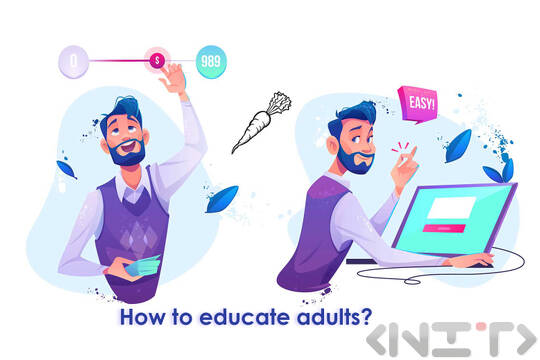
Although we sometimes think that adults have actually grown to the height of children when it comes to learning, we understand that things are quite different. The main difference comes from the way the mature person perceives the learning process and the need for it.
With the accumulation of life experience and entering various cultural and educational environments, the elderly person undergoes personal growth, his values and goals are formed, his idea of the future is built. This shaped model of thinking could guide the creators of e-courses in the right direction so as to structure their learning content in the best and most motivating way for this particular audience.
Here is a list of key features that apply to most adult learners.
• Autonomy. Adults usually prefer a sense of control and autonomy. They like to have options and choices in their learning environment. Even those who are concerned about autonomy can learn to appreciate this approach if given the right initial support.
• Purposefulness. Many adults follow specific goals that they are trying to achieve. They prefer to participate in learning activities that assist them in their implementation.
• Practicality. Mature people in the workplace prefer practical knowledge and experience that would facilitate their work. In other words, adults need learning activities that are applicable in the real world.
• Competence and mastery. Competence in workplace skills is another important element for the adult learner, as it increases confidence and improves self-esteem.
• Experiential learning. Many adults prefer to learn through practice rather than just listening to lectures.
• Emotional barriers. Adults may be afraid, anxious, or angry about forced changes in their job responsibilities or policies. These emotions can interfere with the learning process.
• Orientation towards achieving real results. Adults are results-oriented. They have a specific idea of what they will gain from the learning activities and often drop out of the training if these expectations are not met.
• External responsibilities. Most adults have many responsibilities and commitments to family, friends, community and work. Taking the time to learn can be difficult.
• Potential physical limitations. Depending on their age and physical condition, older learners may have more difficulty reading small fonts and images on a computer screen, and may perceive the material more slowly.
• Overview of the material. The adult learner needs to see the learning material more closely. He needs to understand how the small parts fit into the bigger picture.
• A sense of responsibility. Older learners are often responsible for their own success or failure in learning.
• Need for community participation. Many mature learners prefer to participate in a learning community with which they can communicate and discuss issues and problems.
We at NIT - New Internet Technologies Ltd. know how difficult it is to take care of your home, family, work, yourself, even if you have some free time left. You feel a lack knowledge that you want to fill in, but how? The answer is - easy! You do not need to leave home, just relax in front of the computer and use ready-to-use e-Learning courses. They are presented in an interesting, interactive and easy to learn way. Learn and have fun!
If you are an employer, we have a solution for distance learning of your employees - we can implement e-distance learning with you through one of the distance learning platforms we offer. Do not hesitate to contact us!